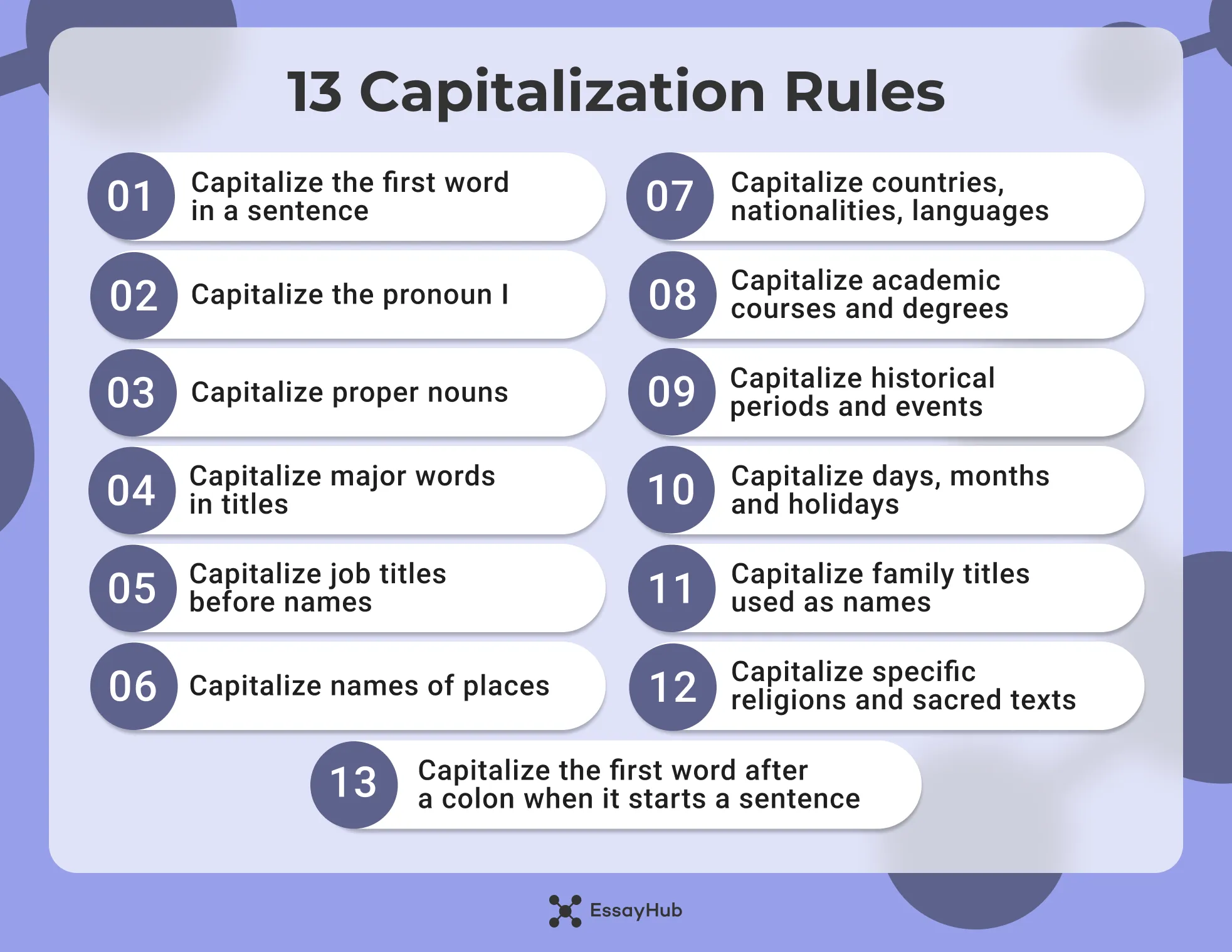Capitalization is important in the English language, as it relies on visual cues for meaning. A capital letter can change the role of a word without changing the spelling. For example, turkey is dinner, while Turkey is a country. Similarly, 'park' is a general term, while Central Park is a place you could actually go.
- Capital letters mark specificity, helping readers distinguish general terms from proper names.
- Most rules follow one idea: capitalize when the word identifies something exact, not a category.
- Consistent capitalization makes essays clearer, cleaner, and easier to read.
In this article, our essay writer team will give you ground rules, examples, and tips for capitalization that actually help.
Printable Capitalization Rules for Students
This capitalization rules PDF handout gives students a quick way to check the most common capitalization rules in English. Each row shows the rule, whether capitalization applies, and a simple example. Below is a free, printable guide.
13 Capitalization Rules for Students With Examples
Capital letters signal what’s specific, what’s general, and where a new idea begins. These rules may look simple on the surface, but each one carries a purpose that keeps your writing clear and easy to navigate. Here are the essentials every student should know.

Capitalizing the First Word in a Sentence
Always capitalize the first word of a complete sentence. English uses capital letters at the start of the sentence for one simple reason: the reader needs to know where a new idea begins.
Examples:
- The class started late today.
- Students turned in their assignments on time.
This rule applies in nearly all contexts. The only real complication appears when a sentence begins with a brand or name that is intentionally lowercase, such as iPhone or eBay. Some writers preserve the lowercase for accuracy, while others capitalize it to keep the visual pattern of standard English sentences. Both approaches are accepted in different style guides.
Example:
- iPhone sales increased this year. (kept lowercase because it’s the official name)
Capitalizing the Pronoun ‘I’
Using the capital ‘I’ is one of the most arbitrary capitalization rules in English. A single lowercase is easy to miss or confuse with another mark, so the uppercase form became standard.
There’s no grammatical exception to this rule. Using ‘i’ is a deliberate stylistic choice. For example, E.E. Cummings, an American poet, famously used it as a rebellion against convention.
Capitalizing Proper Names and Nouns
In English, we capitalize proper nouns because they refer to one clearly identified person, place, brand, or organization. Capital letters prevent confusion by making the specific stand out from the general. They also help the reader navigate information fast because the eye naturally lands on capital letters as anchors in a sentence. A capital letter tells the reader that the word isn’t about a city, a company, or a person in general. It’s about that city, that company, that person.
A few examples:
- Maria Lopez, Dr. Singh, Professor Adams
- France, Boston, Lake Tahoe, the Pacific Northwest
- Nike, Samsung, UNICEF, Harvard University
- World War II, the Renaissance, the Great Depression
- The Catcher in the Rye, Black Panther, Bohemian Rhapsody
Capitalizing the Majority of Titles
Here’s another rule of capitalization: In a title, English highlights major words so the reader can see the shape of the idea at a glance. Your brain immediately grabs the important parts and ignores the connecting words, such as 'of', 'in', 'to', etc. For example, a book is a category, while The Book of Lost Things is a unique item.
Lowercase titles sometimes appear in informal or stylistic writing, but it’s not a standard rule. Academic and professional settings use capitalization to show structure and formality. It’s the same reason a college essay header isn’t written like text messages.
Capitalizing Job Titles and Honorifics
A job title shifts between two roles: a general label and a specific identifier attached to one person. The capital letter appears only when the title works like a name.
Examples:
- I emailed Professor Kim about the assignment.
Here, the title acts like a name, so the capital signals specificity.
- I spoke with the professor after class.
Here, it’s a general role, so the lowercase fits.
Honorifics follow the same pattern: Mr. Lopez, Dr. Singh, function as substitutes for a full name.
There’s an exception, though. A title gets lowercase when it comes after the person’s name in regular sentences.
Example:
- Emma Liu, professor of biology, spoke first.
The title is an appositive (a descriptive tag), so it stays lowercase.
Capitalizing Places
A place name works as a proper noun. It identifies one location in the world, not just a category. Without capitalization, the sentence becomes ambiguous.
Compare:
- We walked through the valley. (any valley)
- We walked through Death Valley. (a unique place)
English capitalizes:
- countries (Japan)
- cities (Chicago)
- regions (the Pacific Northwest)
- continents (Europe)
- bodies of water (the Black Sea)
- mountains and ranges (the Himalayas)
- landmarks (Central Park, Stonehenge)
- specific buildings and institutions (Harvard University, the Supreme Court)
But sometimes, writers use stylized lowercase for design or branding. Some cafés, galleries, or venues intentionally brand themselves in lowercase. But this is pure branding, not a grammar exception.
Capitalizing Countries, Nationalities, and Languages
A country has one official name. A nationality identifies one defined group. A language refers to one recognized system of communication. Capitalizing these words prevents confusion. Without the capital letter, a sentence could easily shift meaning.
Here’s what counts as a proper name in this group:
- the names of countries (Germany, Mexico)
- the names of regions when they act as cultural identities (the Middle East)
- nationalities used as nouns or adjectives (Italian food, Italians)
- languages (Hindi, Russian, Japanese)
- ethnic groups (Cherokee, Oromo, Sami)
Capitalizing Institutions
According to the rules on capitalization, institution names start with capital letters because they anchor those names visually so readers can scan a paragraph and spot key references instantly. It tells the reader that the word is the institution’s formal name, not a role or category.
Examples:
- She interned at Google this summer.
Here, Google is a proper name, so the capital signals precision.
- She interned at a large tech company.
Here, the phrase describes a type of place, so it stays lowercase.
Capitalizing Academic Subjects
Most academic subjects stay lowercase because they name broad areas of study. Words like biology, mathematics, and psychology behave like common nouns because they describe fields the same way music, history, or art describe categories.
English only uses capital letters when the subject becomes a proper name. This happens in three situations:
- Specific course titles:
- Introduction to Biology
- Advanced Calculus II
- Modern American Literature
- Department names that contain proper nouns:
- Department of English
- Department of French and Italian
Here, ‘English’ and ‘French’ are capitalized because they are languages, not because they are subjects.
- Programs, schools, or official units:
- School of Nursing
- College of Engineering
- Bachelor of Science in Computer Science
These are proper names of official academic divisions or degrees.
Capitalizing Specific Periods and Events
Historical periods and events get capitalized because they refer to one specific moment in history. For example, the Renaissance isn’t a stretch of years, but a defined cultural identity. Similarly, World War II isn’t some big war, but the war with a name and a specific set of meanings. It’s the same mechanism that makes Paris different from a city.
If someone writes: ‘the civil war changed everything,’ your brain hesitates: which civil war? But if they write, ‘the Civil War changed everything,’ your brain immediately knows which one.
Capitalizing Days, Months, and Holidays
In English, days, months, and holidays are proper names for points in time.
Capitalization here makes the text easier to read. The eye sees the capital and instantly understands, 'This is a specific moment in time, not just a season or a general timeframe.'
Compare:
- I’ll see you on monday in early spring.
- I’ll see you on Monday in early spring.
Now the meaning immediately becomes clear.
These rules of capitalization for students apply to holidays, too, because each one is a formal, recognized event. Christmas, Easter, Ramadan, and Halloween are named occurrences with tradition, cultural meaning, and fixed dates, even when the date shifts in the calendar.
Capitalizing Seasons in Titles
If the season appears in the name of an event, program, publication, or institution, it takes a capital. For example:
- Winter Olympics
- Spring Festival
- Fall 2025 Catalog
- Summer Term at Oxford University
In everyday English, they stay lowercase because spring, summer, fall, and winter are general categories, not proper names.
So:
- spring semester
- winter weather
- summer vacation
- fall colors
Capitalizing Family Titles
Family titles follow one of the clearest logic chains in English: they get a capital only when the word replaces a person’s actual name. Every other time, they stay lowercase.
Examples:
- I asked Mom to call me back.
- Grandpa told that story again.
- Aunt Marina is visiting next week.
In these sentences, Mom, Grandpa, and Aunt Maria act like names. You’re not describing a category. You’re pointing to one specific person.
If the word can be replaced with the person’s real name, capitalize it. If no, use lowercases.
Capitalizing Religious Terms
English uses capitals only when the word refers to a specific religion, a specific figure, or an official sacred thing.
- If the word names one particular god, it’s treated like a proper noun: God (in monotheistic faiths), Allah, Shiva, Zeus, etc.
- When the word is general, it stays lowercase: ancient gods, Greek gods, a god from mythology.
Major religions and their adherents get capitals. For example:
- Christianity and Christians
- Islam and Muslims
- Buddhism and Buddhists
Sacred texts and official religious names get capitals, too, because they’re treated like book titles or institutional names. For example:
- the Quran
- the Bible
- the Torah
- the Bhagavad Gita
- the Book of Mormon
But:
- She read a bible verse. (Lowercase because it means 'any religious book,' not the specific text.)
As for terms that describe practice or belief, they don’t get capitalized because they’re categories, not names. For example:
- a church service
- a temple visit
- religious leaders
- the afterlife
- saints and prophets (unless you name the specific one)
Capitalizing Directions
Directions get capitals only when the word refers to a region with a cultural, political, or geographic identity.
Examples:
- the South (the cultural region in the U.S.)
- the West (a political or historical region)
- the Middle East (region name)
- Eastern Europe (recognized region)
So, if the direction could appear on a map as a labeled region, you capitalize it.
Compare:
- They moved to the South for college.
- They drove south for college.
Capitalizing Poem Lines
The old tradition says each line should start with a capital letter, but modern poets don’t always follow that.
- Example from America by Walt Whitman:
Centre of equal daughters, equal sons,
All, all alike endear’d, grown, ungrown, young or old,
- From 'The Gaza Suite' by E. Ethelbert Miller
gaza at daybreak
dogs sniff among the ruins
the graves are multiplying
Because poetry privileges feeling, tone, and visual shape over strict grammar, a poet can use uppercase, lowercase, or even mix them to control how the reader pauses and interprets emphasis.
Here are some tips:
- If you’re analyzing poetry, respect the poet’s capitalization choices.
- If you’re writing poetry, choose the capitalization style that fits the effect you want.
Capitalizing Salutations and Closings in Letters
Following standard capitalization rules in English for students, the first word of the salutation is always capitalized because it functions like the opening of a sentence. For example,
- Dear Maria,
- Hello Professor Kim,
- Hi James,
The name or title that follows is also capitalized because it’s a proper noun. You don’t capitalize random words inside the salutation. Only the first word and proper nouns.
As for the closings, they take a capital for the first word the same way titles or labels do. For example:
- Sincerely,
- Best regards,
- Warm wishes,
- Yours truly,
They start with a capital because they function as a fixed expression, not part of a longer sentence.
Capitalizing National, Political, Ethnic, Social, and Athletic Teams
English capitalizes anything that functions like a proper noun with a fixed identity, and these groups fall right into that category.
If a group has a recognized, formal, or historically established name, English treats it exactly the way it treats France, UNICEF, or Harvard University.
- National groups: Japanese, Navajo.
- Political groups: Republican Party, Labour Party.
- Racial groups: Black Americans, Asian Americans.
- Ethnic groups: Sami, Basques.
- Social groups: Girl Guides, Rotary Club.
- Civic groups: Parent Teacher Association, Red Cross.
- Community groups: Neighborhood Watch, Local Historical Society.
- Advocacy groups: Green Movement, Amnesty International.
- Sports leagues: Premier League, NBA.
- Youth organizations: Boy Scouts, Girl Scouts.
Capitalizing Trademarks
Trademarks get capitalized because they work exactly like a person’s name or a city’s name. That’s why you write: Coke, Lego, iPhone, Photoshop, Advil.
Even when brands stylize themselves in lowercase, the 'official' version still counts as a proper noun. Writers sometimes preserve the lowercase (iPhone, eBay), sometimes normalize it with a capital for clarity. Both forms appear in current usage.
But sometimes, English absorbs brand names into everyday vocabulary. 'Taser' and 'Dumpster' started as trademarks. So did 'Aspirin.' When a word becomes completely generic in everyday language, it’s no longer capitalized.
Capitalize The First Word in a Sentence That Is a Direct Quote
A direct quote keeps its original sentence structure. If the speaker said a complete sentence, you reproduce it as a complete sentence. Complete sentences start with capitals, no matter where they appear.
Example:
- She said, 'The exam starts at noon,' and everyone panicked.
The capital on The stays because the quote represents a full sentence the person actually spoke.
Compare:
- She warned that 'the river is rising quickly.'
- She warned that 'The river is rising quickly.'
Lowercase implies the quoted words are just a fragment, while capitalized 'The' tells the reader it’s a full sentence within the quote.
Capitalizing the First Word of a Sentence After a Colon
We capitalize after colon because the thought that follows can stand alone.
Look at this:
- The results were clear: The sample needed another round of testing.
The capital on ‘The’ signals to the reader that we’ve moved into a self-contained idea. This follows the same logic used in academic style systems, such as APA format, which rely on sentence clarity to guide readers.
But a colon can also introduce a list, a phrase, or even a single noun:
- She brought everything she needed for the lab: notebooks, gloves, pipettes.
This distinction is important in structured academic writing, including titles and citations. Guidelines for MLA formatting for essays, for instance, follow the same principle.
Capitalizing Semicolons
One common question in class is whether to capitalize after semicolon or not. A semicolon holds two complete thoughts close together, which is why the word after a semicolon stays lowercase unless it happens to be a proper noun.
For example:
- The storm grew stronger; the lights flickered in every room.
Both clauses could stand on their own, but the semicolon ties them tightly. A semicolon does not begin a new sentence, so the next word stays lowercase. Writers come across this rule as they learn how punctuation affects the meaning of a sentence.
Capitalizing Names of the Planets
Planet names sit in the same category as countries and mountains: they identify one specific thing in the universe. You capitalize them because they behave like proper nouns.
Examples:
- Venus is bright enough to see at dusk.
- Saturn’s rings tilt differently each season.
But English has an exception here. One planet, Earth, shifts between capital and lowercase depending on meaning.
- Earth as the planet: capital.
- earth as soil or ground: lowercase.
In most cases, context makes the correct form clear.
Capitalizing Academic Degrees and Courses
Degree names and course titles operate like official labels, which puts them firmly in proper noun territory. English capitalizes them to signal that they’re formal programs or named classes.
Examples:
- She earned a Master of Public Health.
- I’m taking Introduction to Sociology this term.
But when we talk about a field broadly, the capital disappears:
- I’m interested in sociology.
- He plans to study psychology and history next year.
In other words, the academic world uses capitals when a phrase identifies a specific class, program, or credential. General subjects stay lowercase because they behave like common nouns.
Capitalizing Specific Electronic Sources
Terms like Internet, the Net, and the World Wide Web were originally treated as names - singular, globally recognized systems. That’s why they use capitals in traditional usage.
Example:
- Students turned to the Internet first, then checked academic databases.
Over time, informal writing has blurred the line. Many writers use the internet in lowercase to emphasize everyday connectivity rather than the unique global network. Style guides differ here, so readers will see both.
But in formal writing, the capital still signals the idea of the one global network that connects everything.
Final Words
Academic capitalization rules for students work best when they feel predictable. Each rule signals something specific, such as the start of a sentence, a proper name, an official title, or a defined event. The goal is clarity. Every capital letter conveys a specific or important message to the reader.
Meanwhile, if you want support with formatting or academic structure, remember, EssayHub offers help for all types of student writing!
FAQ
Where Can I Find Capitalization Rules in PDF?
You can get capitalization rules in a clean, printable PDF directly through EssayHub. The platform provides writing guides, downloadable references, and formatting help for students who want clear, reliable explanations.
What Are Common Capitalization Mistakes?
Common errors include capitalizing every noun, capitalizing seasons, giving unnecessary capitals to job titles, and using capitals inside regular phrases. Errors often occur when writers capitalize words that describe general categories rather than specific names. If you need help polishing assignments, an academic ghost writer from EssayHub can guide the process.
Do I Capitalize School Subjects?
Subjects stay lowercase when they refer to general areas of study, such as biology or psychology. They take a capital only when they appear as official course titles or include proper nouns, such as Introduction to Biology or English Literature.
What Words Should Never Be Capitalized?
Common nouns stay lowercase when they describe categories rather than specific names. Words like city, teacher, river, museum, season, and university remain lowercase unless they refer to a particular one.
What Words Need To Be Capitalized?
Capitalize the first word of every sentence and every proper noun. This includes names of people, specific places, countries, languages, holidays, institutions, branded products, and official course titles or degrees.
What Are English Capitalization Rules?
English capitalization rules outline when a word receives a capital letter. These rules cover sentence beginnings, proper nouns, languages, holidays, official titles, and clearly identified events. They help readers understand structure and meaning at a glance. If you need extra support with assignments that require correct formatting, EssayHub’s assignment writing services can help.
- Cairn University. (2016, October). Writing Lab: Capitalization rules. https://cairn.edu/documents/2016/10/writing-lab-capitalization-rules.pdf/
- San José State University Writing Center. (n.d.). Capitalization. https://www.sjsu.edu/writingcenter/docs/handouts/Capitalization.pdf
- University of Guelph. (n.d.). Writing style guide: Capitalization rules. https://www.uoguelph.ca/writing-style-guide/capitalization-rules/





.png)
.png)

